Buying Industrial Wood/Timber Logs for Sale Online: A Comprehensive Guide.
Buy Industrial Wood/Timber Logs for sale online, Timber logs are a vital raw material for various industries, such as construction, furniture making, paper production, and more. Industrial wood, particularly timber logs, are often sourced from forests and then processed to meet specific needs. As industries grow, the demand for industrial wood/logs has risen, making it essential for businesses to find reliable sources to purchase quality timber logs. The convenience of online shopping has transformed how timber and wood products are bought and sold, opening up new opportunities for companies to source their materials online.
This guide will explore everything you need to know about buying industrial wood/timber logs online, covering the types of wood available, where to buy, and frequently asked questions (FAQs).
Types of Industrial Wood/Timber Logs
Before purchasing timber logs online, it’s important to understand the different types of wood that are available. Each type of wood has its unique characteristics and uses. The most common types of industrial timber logs are:
1. Hardwood Logs
-
Examples: Oak, Maple, Birch, Walnut, Cherry
-
Uses: Hardwoods are typically used in the furniture industry, cabinetry, flooring, and high-end wood products. They are strong, durable, and often more expensive than softwood.
2. Softwood Logs
-
Examples: Pine, Spruce, Fir, Cedar
-
Uses: Softwoods are generally used in construction, paper manufacturing, and certain types of furniture. They are easier to work with than hardwoods and are often more affordable.
3. Specialty Wood Logs
-
Examples: Teak, Mahogany, Rosewood
-
Uses: These exotic woods are sought after for luxury furniture, fine joinery, and custom woodwork. They are often more expensive due to their rarity and unique qualities.
Where to Buy Industrial Wood/Timber Logs Online
With the rise of e-commerce, there are various platforms where you can purchase industrial wood and timber logs online. Here are some of the most popular options:
1. Timber Suppliers
-
Examples: Websites like TimberOnline.com, Woodworld.com, TimberTrade.com offer various types of timber logs for industrial use.
-
Benefits: Reliable, specialized suppliers who understand the quality requirements of industrial timber. Often, they can provide customized orders based on your business needs.
2. Marketplace Platforms
-
Examples: Websites like Alibaba, eBay, or Amazon often have timber logs listed by various sellers.
-
Benefits: A wider selection and often competitive prices. However, it’s essential to check seller reviews and quality certifications before purchasing.
3. Local Lumberyards and Millers
-
Many local lumberyards offer the ability to buy timber logs online via their websites or other third-party e-commerce platforms.
-
Benefits: Purchasing locally may reduce shipping costs and support regional businesses. Many of these businesses offer the option to pick up the logs in person.
4. Online B2B Marketplaces
-
Examples: TradeIndia, Made-in-China.com, or GlobalSources are B2B marketplaces where large quantities of industrial timber logs are sold.
-
Benefits: Perfect for businesses looking to buy timber in bulk. They typically offer global shipping and bulk discounts.
Factors to Consider When Buying Timber Logs Online
When buying industrial timber logs online, certain factors need to be considered to ensure you are making a sound purchase. Here’s what to keep in mind:
1. Wood Type and Quality
-
Verify the wood type and its suitability for your project.
-
Ensure the timber logs are from reputable sources and meet industry standards.
-
Ask for certification or proof of sustainable sourcing (FSC or PEFC certifications).
2. Size and Dimensions
-
Ensure that the timber logs meet your required dimensions, such as length, width, and diameter.
-
Many online platforms allow you to customize orders, but it’s important to confirm specifications beforehand.
3. Shipping and Handling
-
Shipping costs for timber logs can be substantial, especially for large orders.
-
Verify the shipping policies, delivery times, and whether the seller offers any guarantees on shipping damage.
4. Pricing
-
Prices for timber logs vary widely based on wood type, size, and quality.
-
Always compare prices from different sellers to ensure you are getting a competitive rate.
5. Vendor Reputation
-
Check customer reviews, seller ratings, and past sales performance.
-
Look for vendors with a strong track record of providing high-quality timber logs.
Frequently Asked Questions (FAQs)
1. What is the difference between hardwood and softwood timber logs?
-
Hardwood logs come from deciduous trees (trees that lose their leaves annually) and are typically denser and more durable, making them suitable for furniture, flooring, and cabinetry.
-
Softwood logs come from coniferous trees (trees that remain evergreen) and are lighter, easier to work with, and used in construction, paper production, and certain furniture items.
2. How can I verify the quality of timber logs online?
-
Look for certifications like FSC (Forest Stewardship Council) or PEFC (Program for the Endorsement of Forest Certification), which indicate that the timber is sustainably sourced.
-
Ask for samples or visit a physical location if possible. Some online sellers also provide detailed descriptions, specifications, and images to help with quality verification.
3. Can I buy timber logs in bulk?
-
Yes, many suppliers and online platforms allow you to purchase timber logs in bulk, especially through B2B platforms. Bulk orders often come with discounts, but shipping costs may also increase.
4. How do I calculate the quantity of timber logs needed for my project?
-
Calculate the volume of timber required based on the dimensions of your project. Timber suppliers can often provide guidance on how many logs you’ll need per unit volume, and many offer online calculators to help.
5. How do I know if the timber logs are sustainably sourced?
-
Check for certifications such as FSC or PEFC to ensure the wood is harvested sustainably.
-
Additionally, inquire with the seller about their sourcing practices and if they comply with environmental guidelines.
6. What should I do if my timber logs arrive damaged?
-
Before purchasing, verify the seller’s return and refund policies regarding damaged goods.
-
Most suppliers offer insurance or a claims process for shipping damage, but it’s best to confirm this upfront.
7. Are there any import/export restrictions on timber logs?
-
Yes, some countries have regulations regarding the import/export of timber logs to protect local forests and ecosystems. Be sure to research any legal requirements, such as import duties or documentation needed for international shipping.
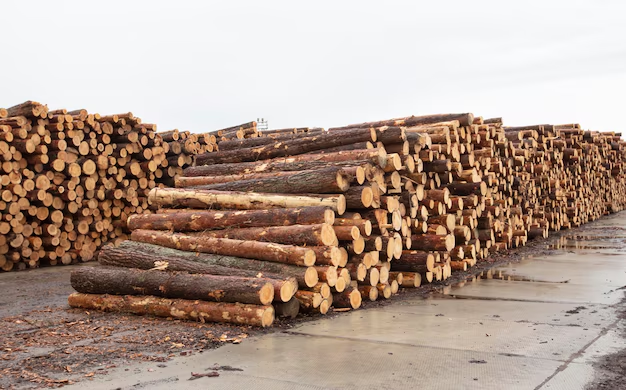
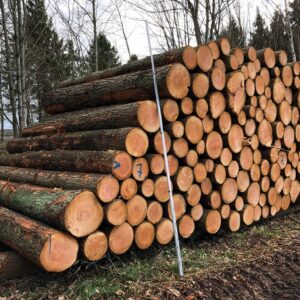
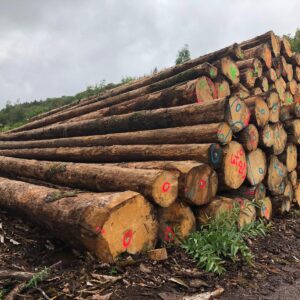
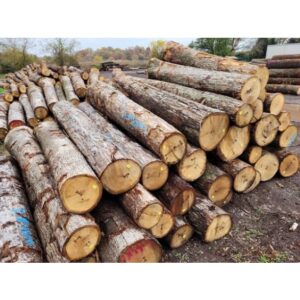
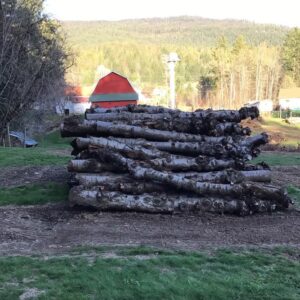
Reviews
There are no reviews yet.